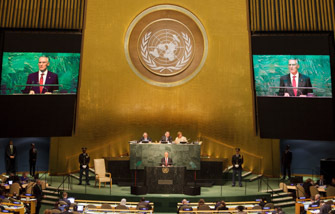
Ladies and Gentlemen,
In the past month of May, I had the occasion to visit three transplant units and one of our Country’s existing centres for research on the compatibility of organs and tissues.
I was then able to personally establish the particular quality of this area in Portuguese Medicine and its crucial importance for the welfare of our fellow countrymen.
Very often, transplant is not just a factor that increases quality to life. It is the decisive component, the literally vital component that ensures the survival of human beings. Transplant increases people’s life expectations – in depth, it gives more life to the living.
Transplanting organs and tissues is an activity that brings together a wide number of attainments and reflects the results of many years of research.
Transplant is only possible due to progress in Medicine and, very specially, to the materialization of such progress in the midst of units provided with multidisciplinary and multi-professional teams, whose drive it is to bring about results which we would initially have considered as impossible.
In order to achieve this, it is necessary to ally the required scientific and technical knowledge to talent, vocation and, above all, experience.
Also fundamental is the great capacity for the organization of all the components required to carry out a precise objective, very often microscopic but with gigantic proportions in its amplest range: to allow life.
We are relevantly active in almost all types of transplant of organs and tissues. Portugal is European leader in the number of kidney and liver transplants per million inhabitants and is within the European average in bone marrow and heart transplants. Pancreas transplants have grown significantly and there have been recent advances in lung transplants. The number of cornea implants has also been growing annually.
We are one of the countries in the world with a higher organ collection, possibly only surpassed by Spain.
In the last few years there was a very significant increase in live donors of kidneys and livers and in collection from cadaver donors.
We have one of the largest European records of bone marrow volunteer donors, with approximately 200,000 registrations. These are expressive numbers, well reflecting the great spirit of solidarity of the Portuguese.
All great undertakings have a beginning and I am here today to pay public tribute and render my great recognition to those who pioneered organ transplants and were the first to tread the difficult paths that made it possible to arrive where we now are.
To be a pioneer, as I have stated before, is to “go ahead, open paths, rent horizons”. But the pioneers here today would have achieved little should they have acted on their own and, for exactly this reason, I also want to distinguish all the professionals who accompanied them in this admirable course. A course made up of leaders but also by the staff that followed them and helped them in the most diverse services and organizations.
Mário Caetano Pereira, unfortunately already passed away, Alexandre Linhares Furtado, Manuel Antunes, João Rodrigues Pena, João Queirós e Melo and Eduardo Barroso, already previously decorated, Manuel Abecasis, Joaquim Murta, Manuel Teixeira and Pedro Pimentel are names that will forever be linked to the first ranking of organ and tissue transplant in Portugal. The institutions where they work or have worked are care providing, scientific and academic nuclei of greatest projection in the context of our health system. To all I render tribute.
Transplant activity is, amongst us, one of the better instances of good public investment, a top technical reference and an exponent in the issue of national and international cooperation and of the mustering of community fellowship.
Transplant of organs and tissues is the result of joint actions within a national environment that overcomes the physical limitations of the units where the medical act is carried out. This is owed to the action of those responsible for the national and regional coordination of collection and transplant, a task that was or still is performed by several of those to whom tribute is being paid. For this alone, notwithstanding your pioneering efforts, you would deserve a word of special regard.
But the results in transplants that should fill us with pride are also due to the joint work of the research centres of compatibility and to the notable efforts of the Collection and Transplant Coordination Offices.
Allow me to address a very special greeting to donors and their families, for the enormous generosity that is represented by giving, verily, a part of ourselves or of a very dear relative so that others may continue living. It is hard to conceive a greater act of altruism. Without donors there would be no transplant of organs or tissues. The large scale donation of organs and tissues by the Portuguese gives us international projection and enhances the great solidarity of our people.
It is also on behalf of those who benefit or may come to benefit from their altruism and your pioneering efforts that I am expressing to all those to whom tribute is being paid the recognition of the Republic for your endeavour and for your dedication. Whoever redeems a life, saves the whole of Humanity. To you all who, throughout your lives, have redeemed many lives, I can only address one, but very impassioned, word: thank you.
© 2006-2016 Presidency of the Portuguese Republic
You have gained access to the records of the Official Site of the Presidency of the Republic from 9 March 2006 to 9 March 2016.
The contents available here were entered in the site during the 10 year period covering the two mandates of President of the Republic Aníbal Cavaco Silva.